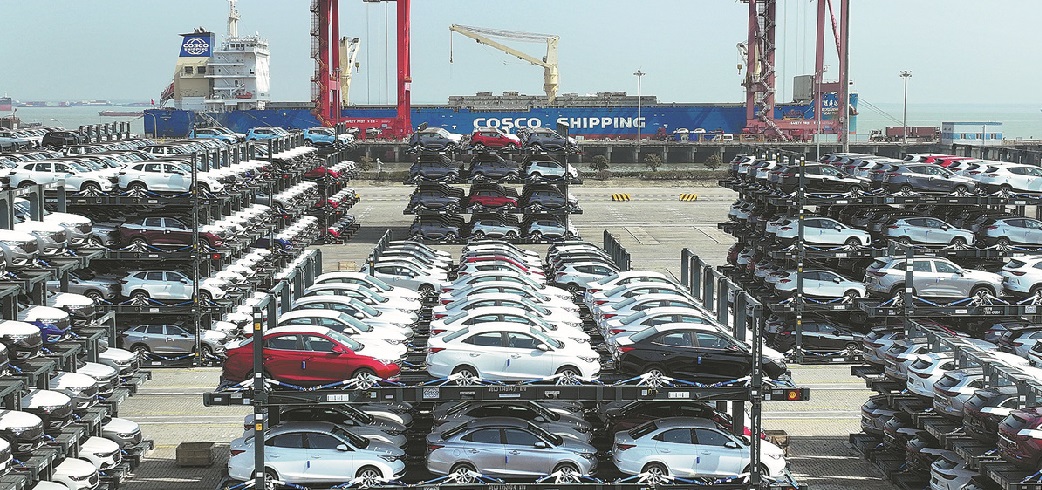In April, the demand for Chinese-manufactured vehicles in the European Union (EU) slowed down, according to analysis published by the sector data company, Jato Dynamics.
The document reveals that while electric vehicles, SUVs, and cars made in the Asian country have been the main drivers of market growth in recent years, last month’s monthly data no longer support this trend.
Regarding battery electric vehicles (BEVs), market share only increased by 0.3 percentage points (from 13.1 per cent in April 2023 to 13.4 per cent last month), while monthly registrations in this category increased by 15 per cent.
The data company, notes that although this figure is higher than the year-on-year market growth overall, it is lower than the monthly increases recorded during 2023.
“The electric car market is not performing as well as last year,” acknowledges Felipe Muñoz, global analyst at Jato Dynamics.
And he continues: “This is largely due to ongoing price cuts, which have raised concerns among consumers about the residual value of BEVs and uncertainty about how prices will evolve in the coming months.”
On the other hand, despite BYD’s “success” in April, Chinese-made cars have not yet become a dominant force in Europe.
The overall market share of Chinese car brands in Europe increased from 2.22 per cent in April 2023 to 2.35 per cent in the same month this year.
Meanwhile, MG accounted for 68 per cent of the total 25,360 units registered by Chinese brands during the month.
“Although there is noise around the arrival of Chinese car brands in Europe, they remain somewhat of a rarity, as demonstrated by the slow increase in registrations over the past year,” Muñoz indicates.
“MG, a brand that many still associate with the West, accounted for two out of every three registrations of vehicles manufactured in China,” he adds.
The analyst argues that the continued inability of vehicles manufactured in the Asian country to truly penetrate the European market could be the result of ongoing perception problems faced by Chinese manufacturers, especially considering the ongoing investigation by the European Commission.
However, units manufactured in China continue to thrive in the BEV market with a market share of 6.6 per cent.
Additionally, the popularity of SUVs slowed down and their market share dropped from 51.3 per cent in April 2023 to 51.1 per cent in April 2024.
Furthermore, registrations only increased by 12 per cent year-on-year, behind the overall market growth during the same period.
According to Jato Dynamics, although SUVs remain the preferred vehicle of several European consumers, April’s data indicates that the market share of the category is likely to be reaching its peak in the near future.
Within the segment, Audi, Ford, Kia, Renault, and Skoda faced challenges, while BMW, Hyundai, Mercedes, Toyota, Volkswagen, and Volvo gained market share.
Last month, a total of 1.08 million new units were registered, an increase of 12.6 per cent compared to April 2023, largely driven by demand for “B hatchbacks” and compact cars.
According to the data company, figures for the year-to-date 2024 show that 4.46 million new units were registered, an increase of 6.7 per cent compared to the same point last year.
Which brand dominated the BEV market?
According to the analysis, Volkswagen led the BEV market in April, despite registering a seven per cent decline in volumes compared to the same month last year.
In second place is Tesla, with a 0.6 per cent growth in registrations, maintaining the Model Y’s top position in the BEV model rankings.
However, BMW was the main driver of growth, with registrations of its electric models increasing by 82 per cent year-on-year.
The German manufacturer registered 14,179 units throughout the month, only 28 units fewer than Tesla.
Volvo, on the other hand, also performed well with 13,275 units registered, representing a 141 per cent increase compared to April 2023.
This was largely due to strong demand for the Volvo EX30, the second best-selling BEV in Europe for the month, the company adds.
Lastly, Jato Dynamics indicates that BYD registered 2,746 units, surpassing Cupra, Nissan, and Toyota to become the fifteenth best-selling brand in the BEV ranking.
Meanwhile, original equipment manufacturers that experienced a decline in electric model registrations last month include Opel/Vauxhall (-37 per cent), Polestar (-26 per cent), Skoda (-13 per cent), and MG (-12 per cent).







